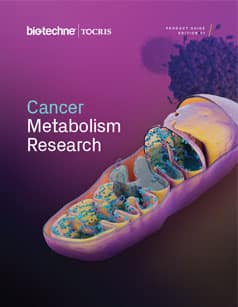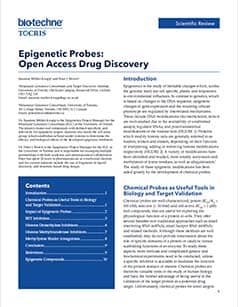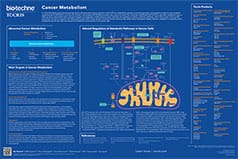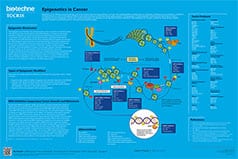Isocitrate Dehydrogenase 1 (IDH1)
Isocitrate dehydrogenase 1 (IDH1) EC:1.1.1.42 is one of three isocitrate dehydrogenase isoforms found in humans. Mutated IDH1 catalyzes α-KG to D-2-hydroxyglutarate (D2HG) and has been linked to tumorigenesis in certain types of cancers.
Isocitrate Dehydrogenase 1 (IDH1) Inhibitors |
|
|---|---|
| Cat. No. | 产品名称/活性 |
| 7087 | AGI 5198 |
| Potent and selective inhibitor of mutant isocitrate dehydrogenase 1 (mIDH1) | |
| 7761 | Ivosidenib |
| Potent inhibitor of mutant isocitrate dehydrogenase (mIDH1) | |
Other |
|
| Cat. No. | 产品名称/活性 |
| 6124 | (R)-2-Hydroxyglutaric acid disodium salt |
| Oncometabolite produced by mutant isocitrate dehydrogenase | |
Isocitrate dehydrogenase 1 (IDH1) EC:1.1.1.42 is one of three isocitrate dehydrogenase isoforms found in humans. IDH1 and IDH2 are homodimeric enzymes found in the cytoplasm and mitochondria, respectively. In their wildtype form, they catalyze the conversion of isocitrate to α-ketoglutarate (α-KG), an essential intermediate in the Krebs cycle. IDH1 and IDH2 are structurally and functionally similar, but they differ substantially from IDH3 (an enzyme that plays a role in the Krebs cycle production of NADH).
In hypoxic cancer cells, or in those with defects in the electron transport chain, HIF-1 mediates signaling that upregulates PDK1 and Myc. This in turn drives IDH1-mediated reductive metabolism of glutamine, a process that is integral to lipogenesis in cancer cells. Genome sequencing projects have identified that mutations in IDH1 are linked to glioblastomas and acute myeloid leukemias (AML), as well as other cancers. Mutant IDH1 converts α-KG to D-2-hydroxyglutarate (D2HG) resulting in high intracellular levels of D2HG, which have been postulated to act as an oncometabolite, driving tumorigenesis. D2HG competitively blocks α-KG binding at a family of enzymes called 2-OG-dependent dioxygenases, which are regulators of important epigenetic events. Mutant IDH enzymes are strongly associated with hypermethylation of CpG islands in AML and glioblastomas. Furthermore, mutations in IDH1 switch the enzyme's function from NADPH production to NADPH catabolism, thus reducing the prevalence of a critical redox mediator.
External sources of pharmacological information for Isocitrate Dehydrogenase 1 (IDH1) :
Literature for Isocitrate Dehydrogenase 1 (IDH1)
Tocris offers the following scientific literature for Isocitrate Dehydrogenase 1 (IDH1) to showcase our products. We invite you to request* your copy today!
*Please note that Tocris will only send literature to established scientific business / institute addresses.
Cancer Metabolism Research Product Guide
This product guide reviews some of the main areas in cancer metabolism research and lists around 150 products that can be used to investigate metabolic pathways in cancer including:
- Glycolysis
- Tricarboxylic Acid Cycle
- Lipidogenesis
- 1C Metabolism and Nucleic Acid Synthesis
- Drivers of Metabolic Reprogramming
- pH and Redox Balance
Epigenetics Scientific Review
Written by Susanne Müller-Knapp and Peter J. Brown, this review gives an overview of the development of chemical probes for epigenetic targets, as well as the impact of these tool compounds being made available to the scientific community. In addition, their biological effects are also discussed. Epigenetic compounds available from Tocris are listed.
Cancer Metabolism Poster
This poster summarizes the main metabolic pathways in cancer cells and highlights potential targets for cancer therapeutics. Genetic changes and epigenetic modifications in cancer cells alter the regulation of cellular metabolic pathways providing potential cancer therapeutic targets.
Epigenetics in Cancer Poster
This poster summarizes the main epigenetic targets in cancer. The dysregulation of epigenetic modifications has been shown to result in oncogenesis and cancer progression. Unlike genetic mutations, epigenetic alterations are considered to be reversible and thus make promising therapeutic targets.



